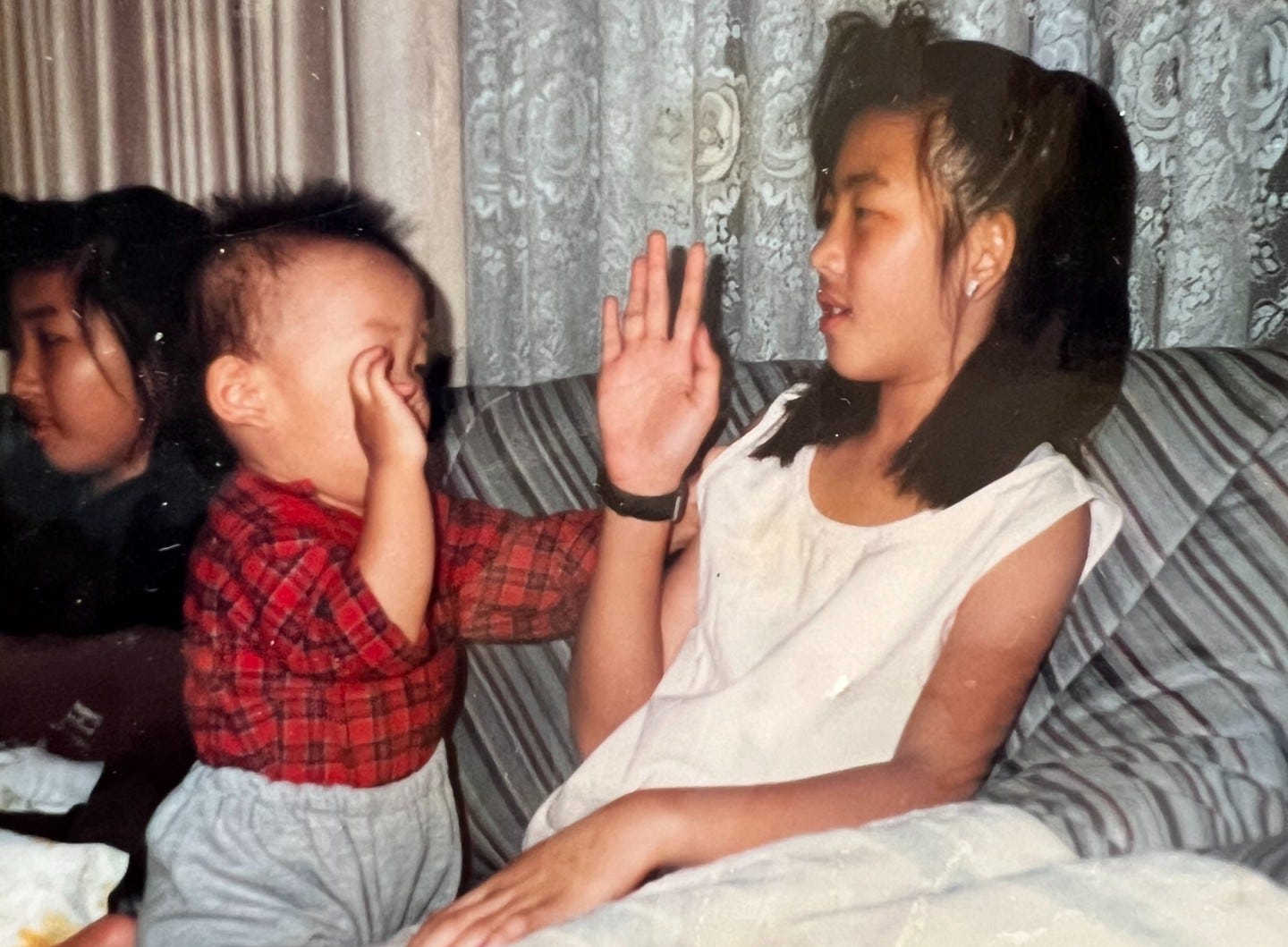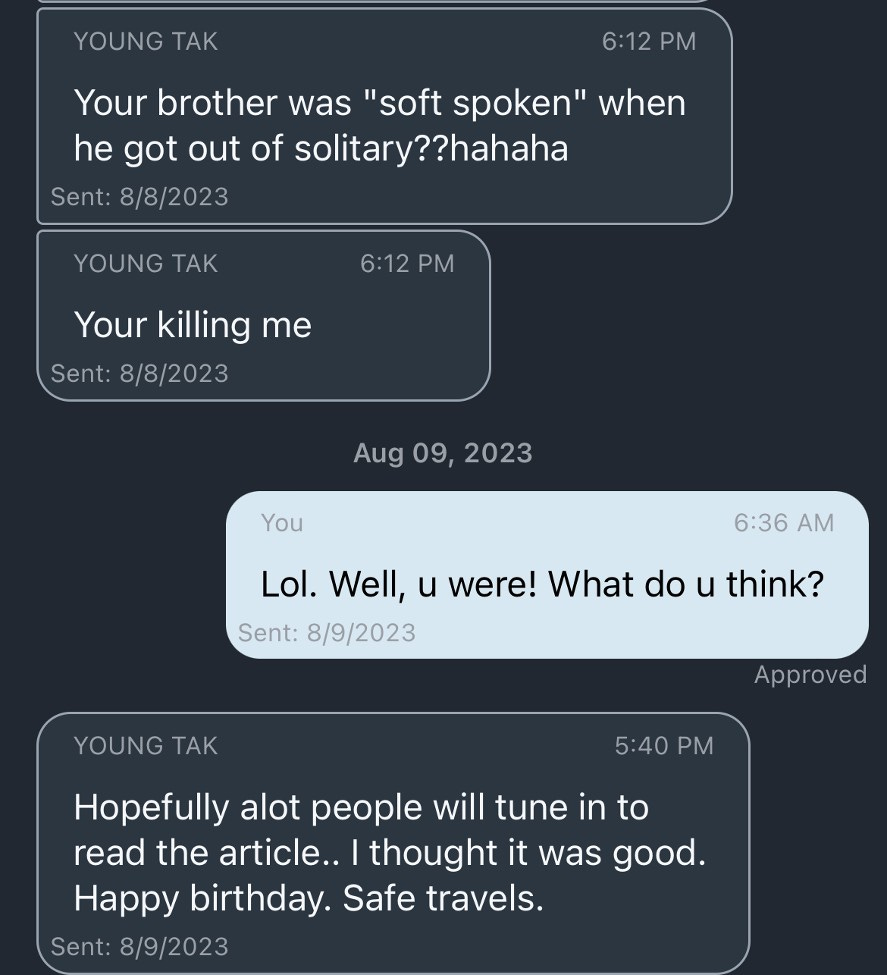Letting go of the last bits of shame
I posted on LinkedIn about my brother’s incarceration and even though it made me uncomfortable, doing it finally freed me from whatever lingering shame I had left. (Ironic choice of words, I know.)
When my Prison Journalism Project article was shared on LinkedIn, I was floored by the amount of engagement and comments, and people reaching out to me. As soon as it was shared, it got over 5,000 views and a flurry of reactions and comments.
I also saw a slew of new Substack subscribers trickle in. (Thank you, if you’re one of the new subscribers. I am humbled and so grateful for your support. 🙏)

Last week was the first time I ever shared anything on LinkedIn about my brother’s incarceration. I kept telling myself I shouldn’t post that stuff because it wasn’t “appropriate,” as LinkedIn is meant for work and blah blah blah.
What I was really saying was, what will my network of over 10,000 professionals think of me, the sister of someone who’s locked up?
I struggled with wanting to share but not wanting to share. On the one hand, I have an entire Substack dedicated to my brother’s stories and a monthly column on PJP. This feeling of shame didn’t make sense to me. But emotions are often complicated and weird and not logical.
I was concerned about the judgment that would come from my professional network of 10,000+ connections, most of whom I don’t even know. I thought about the ones I did know—old bosses, colleagues, peers, and friends I lost touch with… what would they say? How would they react?
If I wanted to make an impact in the world of prison advocacy, I had to make a choice to go all in and let go of whatever shame I was facing.
On the morning I posted on LinkedIn, I tried not to think about how vulnerable I was feeling. I stared at LinkedIn’s “post” button for a few moments. A voice inside said, “Delete and abort!”
But I paused and thought, why is posting this so important?
I thought about my brother and the problem of mass incarceration in our nation—the men, women, and youth who are locked up unjustly and for way too long.
The thing that I want people to feel when they read my stories is empathy, and LinkedIn is as good as any other platform to do that. And also, I’m tremendously proud of my work with PJP and Stories About My Brother. Why not share it? I see other people sharing their achievements on LinkedIn all the time.
So, I hit “post.”
Talking and writing about my bro made me feel less ashamed
It’s been nearly five years since my brother has been in prison and getting to the point of sharing it on LinkedIn took just as long. Over time, the more I wrote about it for my memoir and opened up to others about his incarceration, the less scary and dramatic it felt.
In the early days after Isaac was sentenced, I only told a few people about his whereabouts. Each time I did, I cried as I told the story. But mostly, I suppressed my thoughts and feelings and got pretty good at compartmentalizing—smiling and acting normal at the office, pretending like nothing was wrong.
But each time I received Isaac’s letters, the heaviness returned. It was the reminder I didn’t want—oh yeah, he’s in prison. I felt this way each time I saw the “Prison/Jail” caller ID pop up on my phone too.
It wasn’t until my very first visit to him at Kern Valley State Prison that I realized I needed to write about his situation. That day, something inside me shifted. There was something about seeing him in person and coming to the realization that he was safe and continuing to live the best he knew how. I still felt sorry for him, but I suddenly wanted to help him.
Shame is believing we are flawed and unworthy
Even though shame is universal, it’s complicated and often not talked about enough.
Author and research professor Brene Brown studies shame for a living. She says, “Shame is the intensely painful feeling or experience of believing that we are flawed and therefore unworthy of love, belonging, and connection.”
Brown believes empathy is the “antidote to shame” and we need to be vulnerable to feel connections with others.
Posting on LinkedIn made me feel like I was spilling my secrets. But I hoped my message of empathy would resonate.
Family shame
On some level, my entire family is ashamed, especially since we’re Korean and Koreans (and Asians) have a thing about sons in their families and parents bragging about them.
To this day, I don’t even think my relatives (on my mom’s side) in Korea know about Isaac’s incarceration. Even though my mom isn’t that close with her siblings, they know Isaac really well—he spent summers in Korea as a kid and even lived there in his early 20s for many years.
Over the years, I check in, asking my mom if she’s finally told them. Each time, she laughs nervously and gives me a vague answer, like, “Maybe they know?” or shakes her head.
I wonder what sort of shame my brother feels. Based on what I see, I don’t feel like he is. But then again, he’s not in touch with his emotions. Maybe he doesn’t even realize he’s ashamed.
After posting on LinkedIn, I decided to print out the PJP article and share it with my brother.
He received it this past week. Here’s what he wrote to me from his prison tablet. (For context: there was one part in the article where I wrote about how I thought his time in the hole for eight months affected him.)
More stories…






Your second guessing yourself about sharing something so personal is so relatable. I had the same conversation with myself over and over when I was trying to decide who it was “safe” to share what I was writing on Substack with. I want to bring awareness to abuse and trauma and share resources for people with C-PTSD more than I want to hide, and its because other brave people (like yourself) pave the way. So, thank you!
Your "should I, shouldn't I" dialogue reminded me of something Meg Conley said in a comment thread we were in. Meg posted a picture of some small hair ringlets in a bathroom sink, saying this was the instinct (to give her hair a trim) that rose up while getting ready for an interview. I asked if the interviewer was taking a picture, to which Meg replied, "No. I just don't like being perceived."
I've been carrying that around for a little bit now, and I think that's a real "suitcase of stuff" we all carry around to a degree. On LinkedIn especially, these folks used to know the entrepreneurial and always confident (but behind the scenes burning out, melting down, depressed) Amanda, and that same pause shows up for me. What will they think... How will I be perceived differently?
Anyways, just wanted to relate and say I'm so inspired to keep sharing the stuff I'm creating over here on my newsletter. It's been about a month now of posting to LinkedIn, and everything gets crickets or some VERY "left field" likes from people I'd maybe rather not be reminded of. ;)